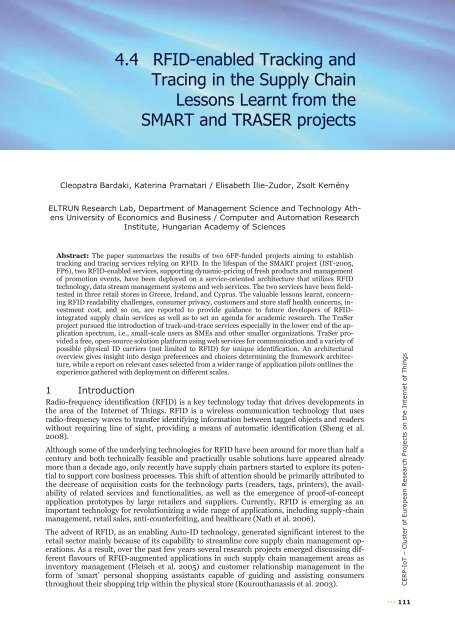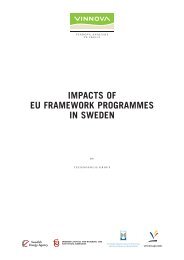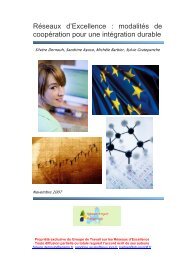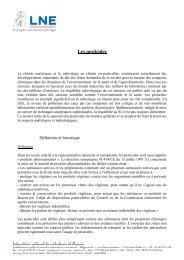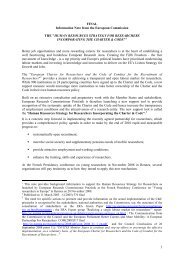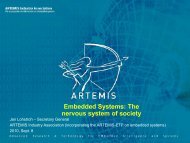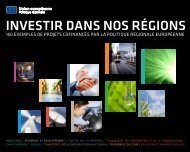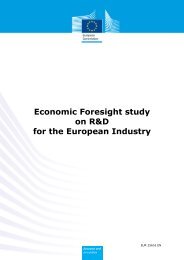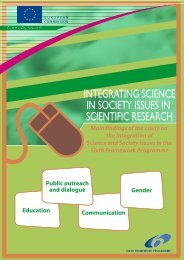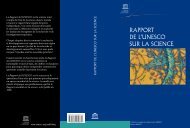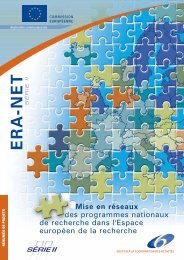Vision and Challenges for Realising the Internet of Things
Vision and Challenges for Realising the Internet of Things
Vision and Challenges for Realising the Internet of Things
You also want an ePaper? Increase the reach of your titles
YUMPU automatically turns print PDFs into web optimized ePapers that Google loves.
4.4 RFID-enabled Tracking <strong>and</strong><br />
Tracing in <strong>the</strong> Supply Chain<br />
Lessons Learnt from <strong>the</strong><br />
SMART <strong>and</strong> TRASER projects<br />
Cleopatra Bardaki, Katerina Pramatari / Elisabeth Ilie-Zudor, Zsolt Kemény<br />
ELTRUN Research Lab, Department <strong>of</strong> Management Science <strong>and</strong> Technology A<strong>the</strong>ns<br />
University <strong>of</strong> Economics <strong>and</strong> Business / Computer <strong>and</strong> Automation Research<br />
Institute, Hungarian Academy <strong>of</strong> Sciences<br />
Abstract: The paper summarizes <strong>the</strong> results <strong>of</strong> two 6FP-funded projects aiming to establish<br />
tracking <strong>and</strong> tracing services relying on RFID. In <strong>the</strong> lifespan <strong>of</strong> <strong>the</strong> SMART project (IST-2005,<br />
FP6), two RFID-enabled services, supporting dynamic-pricing <strong>of</strong> fresh products <strong>and</strong> management<br />
<strong>of</strong> promotion events, have been deployed on a service-oriented architecture that utilizes RFID<br />
technology, data stream management systems <strong>and</strong> web services. The two services have been fieldtested<br />
in three retail stores in Greece, Irel<strong>and</strong>, <strong>and</strong> Cyprus. The valuable lessons learnt, concerning<br />
RFID readability challenges, consumer privacy, customers <strong>and</strong> store staff health concerns, investment<br />
cost, <strong>and</strong> so on, are reported to provide guidance to future developers <strong>of</strong> RFIDintegrated<br />
supply chain services as well as to set an agenda <strong>for</strong> academic research. The TraSer<br />
project pursued <strong>the</strong> introduction <strong>of</strong> track-<strong>and</strong>-trace services especially in <strong>the</strong> lower end <strong>of</strong> <strong>the</strong> application<br />
spectrum, i.e., small-scale users as SMEs <strong>and</strong> o<strong>the</strong>r smaller organizations. TraSer provided<br />
a free, open-source solution plat<strong>for</strong>m using web services <strong>for</strong> communication <strong>and</strong> a variety <strong>of</strong><br />
possible physical ID carriers (not limited to RFID) <strong>for</strong> unique identification. An architectural<br />
overview gives insight into design preferences <strong>and</strong> choices determining <strong>the</strong> framework architecture,<br />
while a report on relevant cases selected from a wider range <strong>of</strong> application pilots outlines <strong>the</strong><br />
experience ga<strong>the</strong>red with deployment on different scales.<br />
1 Introduction<br />
Radio-frequency identification (RFID) is a key technology today that drives developments in<br />
<strong>the</strong> area <strong>of</strong> <strong>the</strong> <strong>Internet</strong> <strong>of</strong> <strong>Things</strong>. RFID is a wireless communication technology that uses<br />
radio-frequency waves to transfer identifying in<strong>for</strong>mation between tagged objects <strong>and</strong> readers<br />
without requiring line <strong>of</strong> sight, providing a means <strong>of</strong> automatic identification (Sheng et al.<br />
2008).<br />
Although some <strong>of</strong> <strong>the</strong> underlying technologies <strong>for</strong> RFID have been around <strong>for</strong> more than half a<br />
century <strong>and</strong> both technically feasible <strong>and</strong> practically usable solutions have appeared already<br />
more than a decade ago, only recently have supply chain partners started to explore its potential<br />
to support core business processes. This shift <strong>of</strong> attention should be primarily attributed to<br />
<strong>the</strong> decrease <strong>of</strong> acquisition costs <strong>for</strong> <strong>the</strong> technology parts (readers, tags, printers), <strong>the</strong> availability<br />
<strong>of</strong> related services <strong>and</strong> functionalities, as well as <strong>the</strong> emergence <strong>of</strong> pro<strong>of</strong>-<strong>of</strong>-concept<br />
application prototypes by large retailers <strong>and</strong> suppliers. Currently, RFID is emerging as an<br />
important technology <strong>for</strong> revolutionizing a wide range <strong>of</strong> applications, including supply-chain<br />
management, retail sales, anti-counterfeiting, <strong>and</strong> healthcare (Nath et al. 2006).<br />
The advent <strong>of</strong> RFID, as an enabling Auto-ID technology, generated significant interest to <strong>the</strong><br />
retail sector mainly because <strong>of</strong> its capability to streamline core supply chain management operations.<br />
As a result, over <strong>the</strong> past few years several research projects emerged discussing different<br />
flavours <strong>of</strong> RFID-augmented applications in such supply chain management areas as<br />
inventory management (Fleisch et al. 2005) <strong>and</strong> customer relationship management in <strong>the</strong><br />
<strong>for</strong>m <strong>of</strong> ‘smart’ personal shopping assistants capable <strong>of</strong> guiding <strong>and</strong> assisting consumers<br />
throughout <strong>the</strong>ir shopping trip within <strong>the</strong> physical store (Kourouthanassis et al. 2003).<br />
CERP-IoT – Cluster <strong>of</strong> European Research Projects on <strong>the</strong> <strong>Internet</strong> <strong>of</strong> <strong>Things</strong><br />
111


